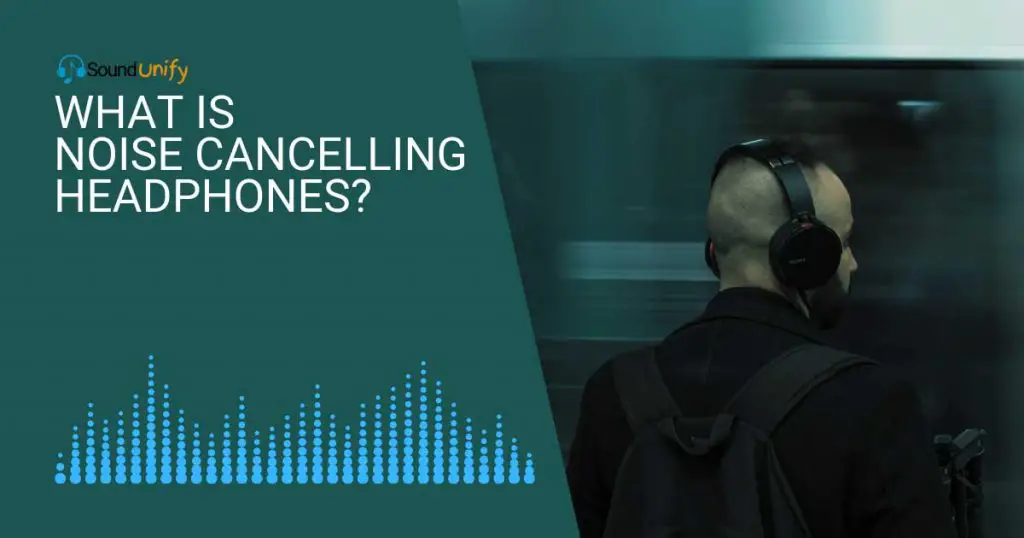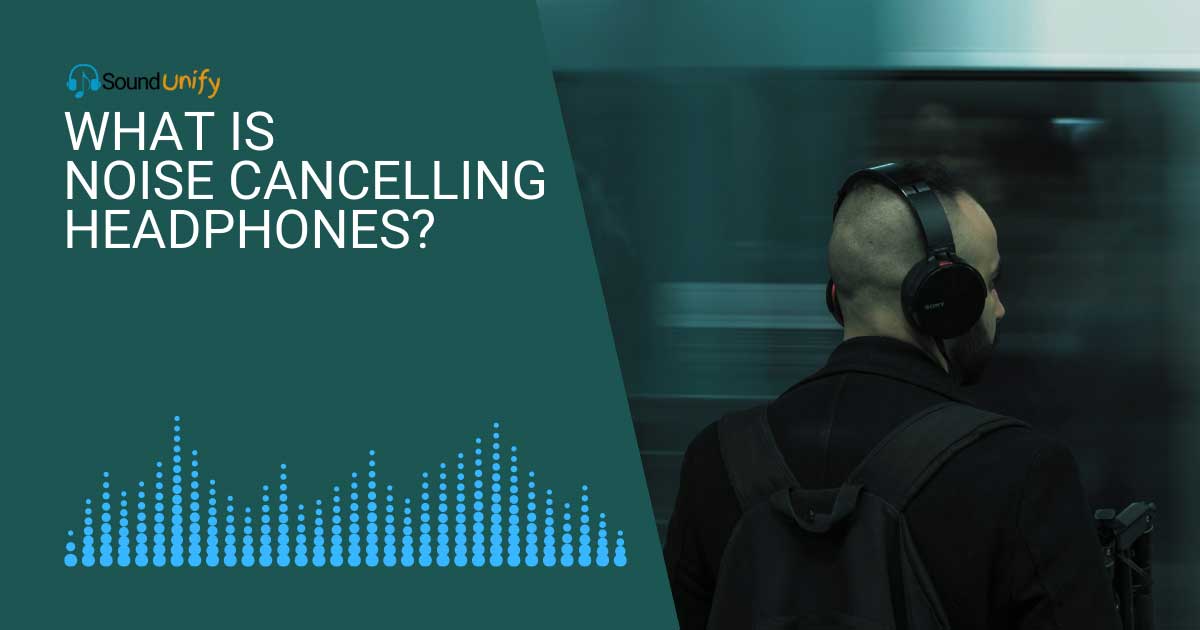Noise cancelling headphones are designed to block out unwanted noise from the surrounding environment. They use special microphones to pick up low-frequency sounds, which the headphones speakers cancel out.
Whether you are a business professional who makes conference calls all day, an airline passenger who wants to catch up on some sleep, or a student who needs to concentrate in the library, you all need a little silence. In those conditions, noise-cancelling headphones can be a lifesaver.
These headphones use sound cancellation technology to reduce noise levels in the surrounding environment to focus in peace. They also help reduce dizziness and fatigue.
So, if you’re looking for a way to reduce noise and improve your concentration, noise-cancelling headphones are a great option.

How Do Headphones Cancel Outside Noise?
Noise-cancelling headphones use a microphone to detect the ambient noise and subtract it from the sound coming through them. They use a microphone to pick up sound waves and algorithms to eliminate unwanted noise.
This results in a quieter environment where you can listen to your music without interruption.
Those are great ways to block distractions while listening to music or watching a video. They create a virtual barrier between you and the sound around you.
This barrier then blocks out the surrounding noise, making it easier to focus on what you’re listening to or watching.
Types of Noise Cancelling Headphones
There are two main types of noise-cancelling headphones, active and passive. Both types of noise-cancelling headphones have their pros and cons.
1. Passive Noise Cancellation
Passive noise-cancelling headphones don’t have a microphone; instead, they rely on Acoustic Engineered Noise Reduction (AENR) technology. This technology uses tiny sound waves to cancel out external noise.
You can use headphones at airports, train stations, and buses. Also, you can use it for working or studying in quiet rooms.
2. Active Noise Cancellation
Active noise cancelling technology uses microphones and advanced signal processing to detect and eliminate environmental noise. This technology helps reduce background noise so you can enjoy your music peacefully. It is perfect for traveling, commuting, and any other loud environment.
This technology best works between 50 Hz and 1 kHz of frequency. Those are also perfect for reducing environmental noise, such as airplane engines or busy streets. You must ensure the headphones you choose have active noise cancellation turned on to get the best results.
The Benefits and Drawbacks

Whether you’re a music lover looking for headphones that will give you top-quality sound, or someone who is always on the go and needs to block out ambient noise, noise-cancelling headphones are an excellent option. But like any other headphones, they also have some pros and cons.
Benefits
There are also some benefits of using noise-cancelling headphones. Such as
1. It Can help you to focus
Noise-cancelling headphones can help you to focus by blocking out distractions and allowing you to hear your music or audio more clearly. That can help you to stay on task and concentrate on what you are doing.
2. They can help you to sleep
Noise-cancelling headphones can help you to sleep by blocking out unwanted noise and providing a soothing listening experience.
Whether you’re trying to block out the sound of a snoring partner or the hustle and bustle of city traffic, they can help you to fall asleep and stay asleep.
Look for headphones that offer a comfortable fit and adjustable noise cancellation settings to find the perfect level of quiet for your needs.
3. Can reduce ambient noise
Some of the best noise-cancelling headphones are designed to reduce ambient noise, such as in an airplane or busy street. So, they can be an excellent option for people suffering from ear infections or tinnitus.
4. Help you to relax
They can block out stressful noises that can keep you from falling asleep or concentrating, such as in a hospital setting. They can also help reduce stress and anxiety by providing a calming and peaceful environment.
5. Help you stay healthy
Noise can be a major source of stress and lead to hearing loss over time. Using noise-cancelling headphones can help reduce your noise exposure and improve your overall health. By blocking harmful noise pollution, you can focus, relax, and keep your health in check.
Drawbacks
Noise-cancelling headphones can also have their own set of drawbacks. Such as
1. They are expensive
Noise-cancelling headphones can be expensive, especially if you’re looking for wireless versions that work with devices like phones or laptops.
2. It may not work well in all environments
Active noise cancellation technology is only as good as the ambient noise it’s trying to cancel out. So, if you’re in a noisy atmosphere, they may be unable to do their job well.
3. May require batteries
Many noise-cancelling headphones also need batteries to work, which can be a downside if you’re not always near an electrical outlet or don’t want to carry around spare batteries.
4. Can affect sound quality
If the active noise cancellation is turned off, then the sound quality of the headphones will suffer because it will compete with ambient noise.
Additionally, if your ear canal is tiny, then active noise cancellation could produce more background noise than before because it can worsen low-frequency sounds that are difficult to suppress
4. Can interfere with other audio sources
Suppose you’ve got another audio source playing in the background (like a podcast). In that case, noise-cancelling headphones may not be able to pick up on it correctly, resulting in inconsistent or garbled audio.
Settings Of Noise Cancellation

Noise-cancelling headphones are a great way to reduce ambient noise and make your surroundings quieter. You can find earbuds and over-ear headphones that offer this feature, and various noise-cancellation types and settings are available.
To cancel out specific sounds, like engine noise or barking dogs, try using a Noise Cancelling Feature Listener. To reduce ambient noise, try installing headphones near windows or other noisy areas in your home.
If you’re looking for headphones that offer noise cancellation more comprehensively, consider investing in a pair of earbuds or over-ear headphones that offer active noise cancellation.
Can Noise-Canceling Headphones Cause Dizziness?

Yes, noise-cancelling headphones can cause dizziness. This is because when the headphones cancel out noise, it can disrupt your balance. That can cause you to feel dizzy or off balance.
If you experience dizziness while using noise-cancelling headphones, you should stop using them and see a doctor.
Make sure the ear cups are completely sealed to reduce external sound exposure. If you experience any symptoms like vertigo or lightheadedness after wearing them, discontinue use and consult a health professional.
Finally, before using your noise-cancelling headphones for the first time, try them out in a quiet environment to ensure they work as designed.
FAQs
Q. How do you choose a good pair of noise-cancelling headphones?
When looking for the best noise-cancelling headphones, it’s important to consider a few key factors.
1. First and foremost, you need headphones with a wide frequency response range to cut out all types of ambient noises. That will help keep you sound isolated in environments where another noise is present, such as in busy streets or airports.
2. Next, make sure that the headphones have good noise-cancelling technology. That will block out ambient noise so you can peacefully hear your music or video.
3. Most importantly, ensure that the headphones are lightweight and comfortable. You will wear them for hours, so they mustn’t be too cumbersome or tight-fitting.
Q. What are the benefits of noise-cancelling headphones?
Noise-cancelling headphones are a great way to reduce environmental noise and improve concentration. They offer several other benefits, like improved sound quality, sleep, stress relief, and anxiety reduction.
When purchasing noise-cancelling headphones, the key features include the audio quality (especially in terms of sound clarity and bass), battery life, fit, and comfort.
Q. Do noise-cancelling headphones actually work?
Yes, noise-cancelling headphones work. They use microphones to pick up on ambient noise and then create a sound wave that cancels it. That can be helpful in environments with a lot of background noise, such as on an airplane or in a city.
Q. Can noise-cancelling damage ears?
Some people may experience a mild form of tinnitus, or ringing in the ears, after using noise-cancelling headphones, but this is usually temporary and goes away on its own. Please consult your doctor or audiologist if you have any concerns about using noise-cancelling headphones.
Conclusion
Noise-cancelling headphones are a great way to improve your listening experience. You can focus on the music or audio without distraction by blocking out background noise.
There are a variety of noise-cancelling headphones available on the market, so be sure to do your research to find the best pair for you. You can enjoy your music or audio without interruption with the right pair of noise-cancelling headphones.
References:
- https://en.wikipedia.org/wiki/Noise-cancelling_headphones
- https://www.nytimes.com/wirecutter/blog/what-noise-cancelling-headphones-do/
James Dimento is a Chief-in-Editor of SoundUnify. He is a headphone enthusiast and creative writer passionate about audio technology. He has three years of experience writing about headphones and sound quality and is responsible for creating reviews and taking care of all administration.
